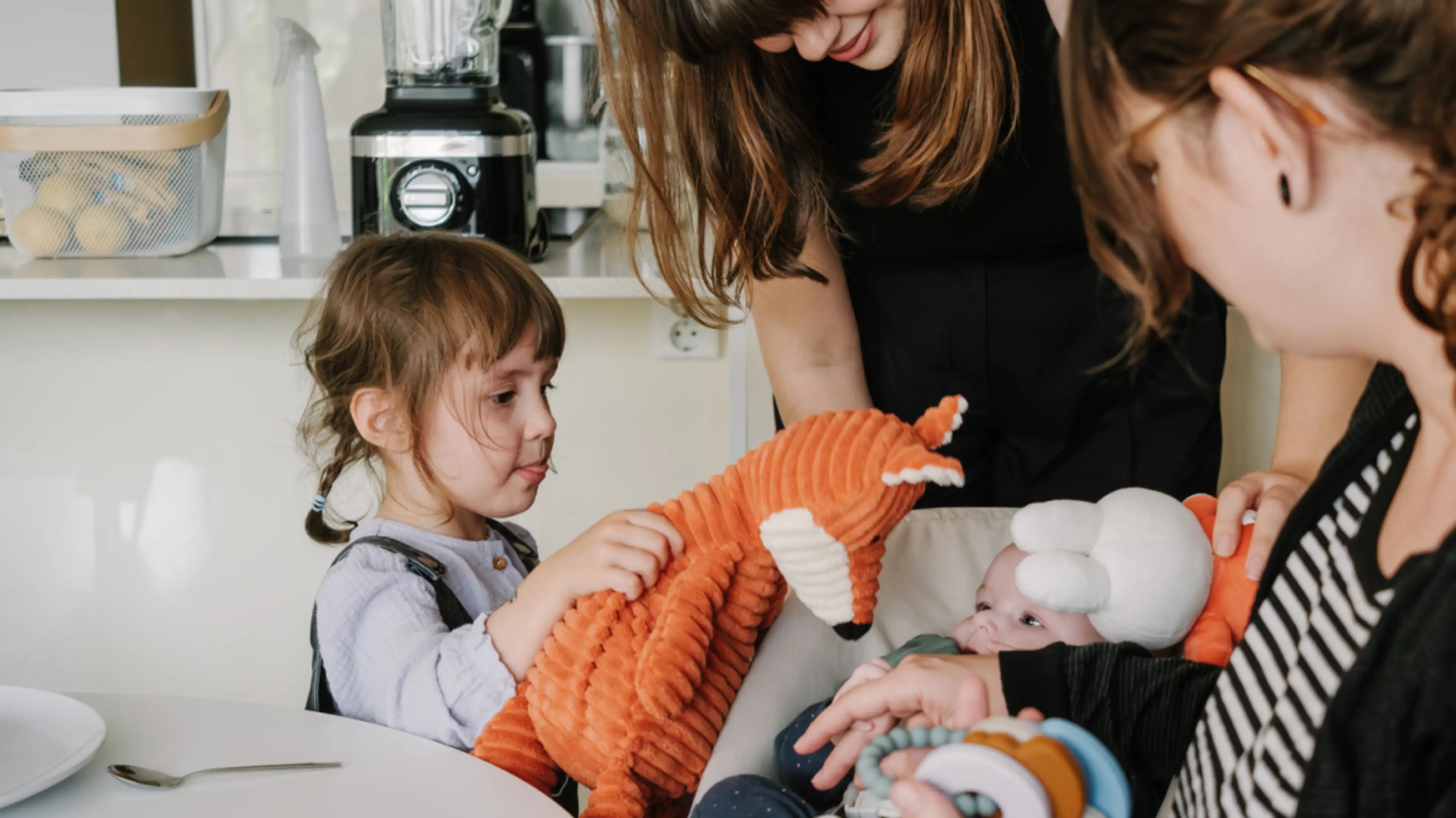As a first-born daughter and recovering perfectionist, I have a hard time asking for help. I’m so used to being the person other people rely on that it honestly doesn’t dawn on me to lean on others. I’m hard-working. I’m self-sufficient. I get the job done.
And then I became a mom.
As a first-time mom, I’ve often felt a lot of pressure to “have it all together.” There is this overwhelming sense of needing to have all the answers and know exactly what to do in any given moment lest I be deemed a Bad Mom.
When my daughter was born, my husband and I were living with my in-laws after a failed house search following a move from Chicago to Ohio. My mother-in-law offered to help so many times, but more often than not I declined unless I really, truly needed it (like that time there was a blowout to end all blowouts). I felt as though I had to prove myself as a mom—that I was capable, that I could handle it. Ultimately, my stubbornness (mixed with postpartum depression and anxiety) ended up getting the best of me.
Fast forward to about a year later and we were happily settled in our own place back in Chicago. By this time, the three of us had our routine down pat. After daycare, my husband would make dinner while I occupied the baby. He’d change her diaper, change her into her pajamas, and then I’d nurse her for a while before he read her bedtime stories and rocked her to sleep.
Then, on one particular evening, he was at an event and I was left to my own devices. As I wrote in my debut book, Stop Waiting for Perfect, I was feeling super anxious, but I tried to convince myself it would be fine. “I got this,” I said to psych myself up. “I can handle this.” In the movie version of my life, Morgan Freeman would have been in the background narrating, “She would soon learn that she could not, in fact, handle it.”
Try as I might, this girl simply wouldn’t go to sleep. I would rock her to sleep, gently place her in her crib, and she’d sit right back up. I’d tried again, put her in her crib, and she’d pull herself up to stand. Eventually, I gave up and started pacing around her room while holding her, trying to lull her back to sleep. My husband came home to find both me and the baby crying.
I felt like a failure, so I texted a mom friend who assured me that I was not a Bad Mom. The next day, however, I saw another mom post on Instagram about how she’d renovated her husband’s home office while he was away on a two-week business trip. All while having two young children at home. Here she was thriving while her husband was gone for two weeks. Meanwhile, I could barely survive two hours. I felt like a failure…again.
That’s when I took to Instagram and posted an S.O.S. of sorts. Raising a tiny human, working a full-time job, and writing my first book all at the same damn time was really hard and I was struggling. In my moment of vulnerability, two friends immediately reached out and asked if I needed help. For the first time that I could remember, I put my pride aside and said yes.
As I mentioned earlier, I’m not the best at asking for help; it’s simply not in my DNA. I don’t love relying on other people to get things done (perhaps I’ve been scorned by too many group projects gone awry). But parenting has been a humbling experience, and I’ve had to open myself up to receiving help more than ever before.
“There’s this thought that it’s exclusively a mother who should be 100% doing everything for their newborn child. Otherwise, it shows that they’re not a good enough parent and they’re not ready to be a mom,” says Reena Patel, a parenting expert, positive psychologist, and licensed educational board certified behavior analyst. “We forget that pregnancy is three trimesters, but there is a fourth trimester and that really is about the self-care of the mom. You need to give the parent grace during that time to heal their body physically, but also mentally and get adjusted to this new normal.”
Some signs that you might need help include:
Not getting enough sleep
Easily frustrated/angry (tend to snap)
Feeling isolated
Not having health conversations with family or friends
“These are all warning signs that I’m not giving myself the best care,” says Patel. “I want to be 100% so I can be 100% for my child, and I need to get some help.”
If you, like me, struggle with asking for help, Patel recommends getting a head start by creating a postpartum plan that dictates exactly how you’d like your village to show up for you.
“Anxiety is fear of the unknown, so the best thing you can do prior to even giving birth is create a system that works best for you,” she says. “This requires really looking at your network and identifying their strengths. What is it that they're good at helping and supporting with?”
When it comes to overzealous grandparents (and in-laws). Patel suggests having conversations ahead of time regarding what you would like support with and what you’d like to learn on your own.
“Oftentimes grandparents want to use their wisdom and think they know best, but that can really contribute to low self-esteem and wondering if you’re a good mom,” she says.
When asking for help, it’s important to be as specific as possible. You could say, “I know you offered to help a few weeks ago and I’m definitely in a time of need. Would you be able to watch the baby while I take a shower?”
Joining support groups for new parents, whether they’re in-person or virtual, can also be helpful as you navigate different situations.
“Even as a new mom, there is this reciprocity that when you connect with others you also have an opportunity to share some of your own wisdom and get that validation from other moms who’ve been through it. Because you’re not the only one who’s ever dealt with difficulty breastfeeding.”
If you need additional support, consider talking to a therapist or psychologist. Remember, there is no shame in asking for help and doing so is not a sign of weakness, but rather vulnerable strength. In asking for (and receiving help), we show our children how to do the same.
“Give yourself grace and give yourself time. Loving your child and communicating with those around you in terms of what your needs are is the best gift you can give to yourself and your child,” says Patel. “It’s okay for there to be trial and error. It’s okay to make mistakes, especially important because as your little one grows older you want them to know it’s okay to make mistakes and figure out how to move forward.”












